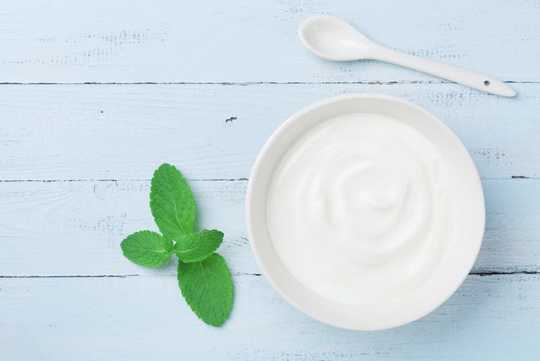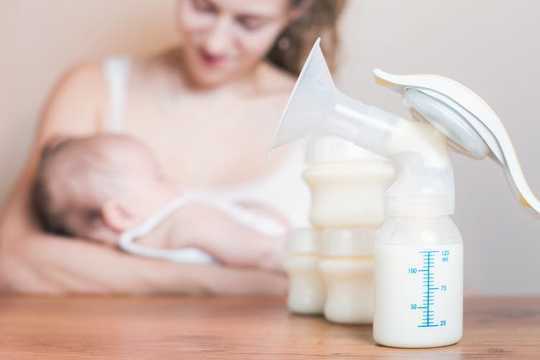 Reducing your risk of breast cancer might be as simple as eating yoghurt. Julia Sudnitskaya/ Shutterstock
Reducing your risk of breast cancer might be as simple as eating yoghurt. Julia Sudnitskaya/ Shutterstock
For each year that a woman breastfeeds, the risk that she will ever develop breast cancer is reduced by 4.3%, on average. The breast, like the intestine, has its own bacterial microflora and breastfeeding changes the varieties of bacteria that make it up. These resident microflora help keep harmful bacteria at bay and help repair the lining in breast ducts.
These changes to the microflora from breastfeeding might be what protects against breast cancer. And there might be other ways of changing the breast’s microflora to protect against cancer, too.
When our team compared the results of different studies that looked at a total of over 1.5 million people, we were surprised to find that eating yoghurt was associated with a reduction in breast cancer. This leads us to believe that by eating natural yoghurt, we can promote a microbiome – the collective genome of all microorganisms, including bacteria, which are essential for our body’s immunity – that helps to guard against developing breast cancer.
Cancer protectors
The milk ducts are lined by a protective layer of cells, which divide and replicate to repair any damage. Damage to the lining can be caused by trauma or inflammation, but cells also die of old age and have to be replaced. The breast’s microflora influences the rate at which these protective cells divide and die – and in turn, perhaps also your risk of developing breast cancer.
Get The Latest By Email
We already know that certain bacteria such as Fusobacterium nucleatum, which is part of the mouth’s microflora, and Helicobacter pylori, which is found in the stomach’s microflora, can also cause inflammation, which increases cell division. When these bacteria cause cells to divide more frequently, over an extended period of time this increases the risk of cancer in organs such as the colon and stomach. A similar scenario is likely to happen in the breasts, which would explain the correlation between breastfeeding and the reduced risk of breast cancer.
Breastfeeding does not only benefit mothers. Breast milk contains and supports the growth of beneficial lactose-fermenting bacteria, which dominate the microflora of the baby, protecting them from germs. There are also many other types of bacteria in breast milk, including germs in low doses, which will train the immune system and help protect the newborn from infections. This training of the immune system provides protection – and also extends to preventing cancer. This is the case through to adulthood.
 Breast milk contains bacteria that prevent infections and cancers. Pavel Ilyukhin
Breast milk contains bacteria that prevent infections and cancers. Pavel Ilyukhin
Live yoghurt contains beneficial lactose-fermenting bacteria commonly found in milk. These are similar to the microflora found in the breasts of mothers who have breastfed. Eating foods like yoghurt, cheese and kefir, that are beneficial to the bacteria’s survival promote their growth, and boost their protective role inside the body.
Exposure to these beneficial bacteria also helps immune cells recognise damaged cells that can turn into cancer. It does this by influencing the receptors and chemical signals that immune cells give off, which means they can then kill and eliminate the damaged cells before cancer develops. Many of the new treatments for cancer that harness the immune system also rely on certain types of bacteria to be present in the microflora.
The benefits of eating yoghurt might also protect against other types of cancers, too. Bacteria and immune cells can move to sites away from the intestine, so eating yoghurt protects the whole body. Germs, such as those that cause gum disease, contribute not only to the development of oral cancer, but also cancers of the oesophagus, colon, pancreas, prostate and breast. So bacteria can affect the whole body.
At any rate, while we have good reason to believe that eating yoghurt could protect against developing breast cancer, further research will need to be done, especially to find out how important this is when combined with other diet and lifestyle factors. A balanced diet, including yoghurt that does not have lots of sugar in it, is important for health and will help prevent many diseases, including cancer.![]()
About The Author
Rachael Rigby, Senior Lecturer in Gastro-Intestinal Health, Lancaster University
This article is republished from The Conversation under a Creative Commons license. Read the original article.
books_food








